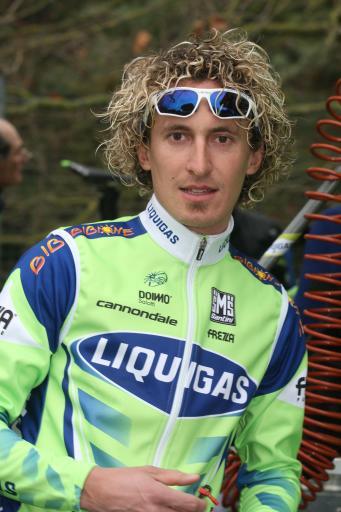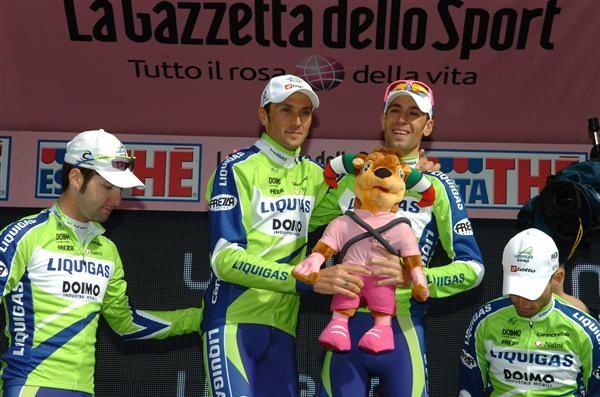Liquigas have won two grand tours this year thanks to Ivan Basso and Vincenzo Nibali. Indeed Nibali’s win marks the first Italian win in a grand tour outside the Giro since Pantani in 1998.
It should be a particular satisfaction for Liquigas that 2010 has proved a vintage year with classic battles and tension right to the end. Perhaps the level at the Giro and Vuelta was simply not as high as the Tour de France but there were no fluke wins.
Questions, questions
But what happens next for Liquigas, how can they manage their star riders? Nibali seems a top prospect but will he want to race the Tour de France next year? This would probably mean forgoing the Giro d’Italia and quite possibly a win here, all to finish behind Alberto Contador. So maybe he wants the Giro d’Italia. But what happens to Basso in this case, will he play helper to Nibali and then have a go at the Tour or the Vuelta, again knowing that Contador is supposed to be eyeing these races?
But many were raising these questions this time last year, Liquigas had a good team on paper and we wondered how the talents and personalities would be managed. Looking back things have gone very well, everyone has had their chance.
Giro-Biopassport
But ironically the entente is because of the bio-passport. Arguably the removal of the alledged Michele Ferrari client Franco Pellizotti allowed Nibali and Basso to shine in the Giro and to then have their chances in the Tour and Vuelta, perhaps leaving Nibali breathing the bigger sigh of relief. And similarly, 2011 will see Kreuziger with Astana, one less internal rival.
So the team will have less headaches but riders and management will still have to sit down and work out who will target what.


This is a problem any French team would love to have.
Sure, many teams would love to have this problem.
If Nibali and Basso were on French teams they'd be shattered from an endless series of Coupe de France races, unable to finish in the top-40 of a Grand Tour because few teams let their riders build to a big event carefully.
Im not sure what you mean when you say "Perhaps the level at the Giro and Vuelta was simply not as high as the Tour de France" … can you explain that further.
That it's easier to win the Giro or Vuelta. Not easy, just easier. When Basso and Nibali have to worry about Arroyo, Vino, Mosquera and Peter Velits, it's just not the same as going up against Contador, and a motivated Andy Schleck and a Menchov in top form. Hope that explains it.
Yes it explains what you mean but I completely disagree. I understand Contador wasn't at either race but every other top rider was. Also both Vuelta and GIRO were much harder races I believe.
I don't think the Tour is harder just that the lazy media says it is. Just like they have practically ignored the Vuelta and only started talking about the GIRO after they realised what a great race it was. Beating Contador at the moment is hard but neither the GIRO or the VUELTA are lesser races just that they don't benefit from the overexposure of a lazy predictable media.
I also don't understand the "how can they manage their star riders". They have a strong team with depth throughout and we can see from how Nibali and Basso work together that they are capable of sharing the races and victories.
Nibali was close to winning two GT's this year. Something that only Contador manages at the moment. Surely this is something to celebrate and write positively about rather than focus on the negative and suggest that there is a problem. I honestly don't see a problem. Basso has even stated that Nibali is the future of Liquigas they are not as you suggest internal rivals. Its a silly statement its like say a football team is only allowed one player who can score goals and nobody else is allowed to.
I have read throughout this season that there is a crisis in Italian cycling and within Liquigas. Their victories this year perfectly highlights again a lazy predictable approach to cycling journalism.
You say "we wondered how the talents and personalities would be managed. " Well this season answers your question. They have been managed very well. So well in fact they have won two of the three GT's with only Contador being the rider who they have not beaten this season.
I just don't understand this blog post when so much of your writing is really good. You sound like one of the lazy hacks from cycling weekly in this country who rely on cliché after cliché in their writing because they constantly fail to have anything important to say.
I don't see where the problem is. Liquigas has a very strong team with multiple riders who can win GT's who are managing their talent really well at the moment. The solution next year will probably be to do exactly what they have done this year. Please leave the cliché and lazy journalism to the hacks like Lionie Birnie and Ed Pickering you are a great writer and have some amazing ideas. This however is not one of your finest.
Interesting point Simon and I'd like to know IR's response.
If theres no personal rivalry there is shared ambition. Lets say maybe both want to win the giro next year and the team will need to settle who is the main man. Hopefully this can be agreed by the riders. It is a nice position to be in.
Hi Simon. I wasn't trying to stoke up the rivalry side of things, pitting two team mates against each other in a false contest. It's more a question of having two big guns and deciding where to deploy them. As I say, this is a team with two grand tours in a year. Maybe I should have called the item something like "The luxury of choice"?
As for comparing grand tours, they're all hard. I don't like lists and rankings, the point isn't to compare the Tour and the Giro but to enjoy them both. They don't clash after all.
Still, both Menchov and Andy Schleck weren't at the Giro and in many ways they weren't at the Vuelta either. The point isn't to compare races, more the riders taking part. There are guys in the top-10 at the Giro and Vuelta who simply could never dream of a top-10 in the Tour. Many riders say the Tour is harder, the stress and pressure is a step above and the climbs are that big longer, even if they aren't as steep. Does all this make for better racing? Not really, the Tour can be too formulaic for me.
Anyway, thanks for the comments. It's nice to get feedback from readers.
Thanks IR thanks for the replies and comments….
Sorry Simon, but I have to concur with IR.
I'm not saying the Tour is the better race but it is definitely the bigger and the harder race.
It is the bigger race because it is better known and has the bigger media attention as you yourself pointed out and lamented and ergo there is more money in it. And this is also what makes it harder, through the higher media interest the pressure from the management and sponsors is bigger, the competition is even harder and and media duties longer and more tiresome. It is sad but we all know there are riders using the Giro or the Vuelta as preparation either for the Tour or the WC. The riders might be the same person but totally different opponents at the Tour.
This has nothing to do with how the race plays out or how the stages look like. Or how much suspense or drama it includes. How well the stages are thought up or the riders ride or great the fans are.
I didn't follow the Giro as closely this year, but I can say that the Tour, and especially the Vuelta, were epics. All three cut down to just one long, selective ITT, followed by an explosive queen stage. Coincidence?
The parcours of these GTs might be all Liquigas needs to know to make a decision. Any race getting near 100k of time trialing will obviously favor Nibali over Basso.
Champs, time to buy the Giro highlights DVD or watch the highlights on youtube.